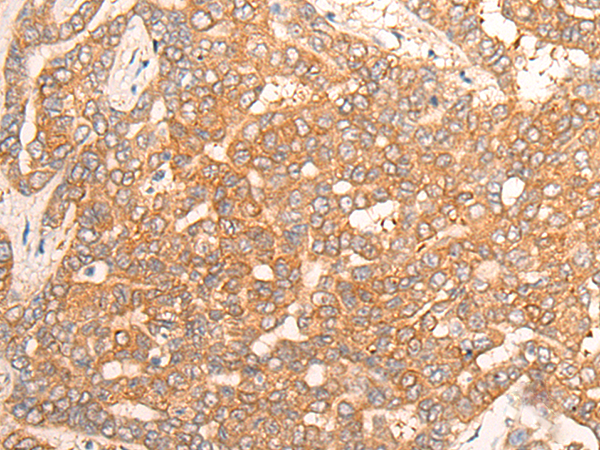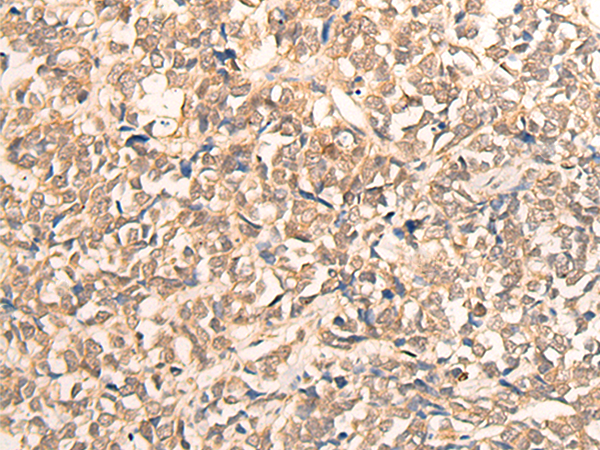

| WB | 咨询技术 | Human,Mouse,Rat |
| IF | 咨询技术 | Human,Mouse,Rat |
| IHC | 1/30-1/150 | Human,Mouse,Rat |
| ICC | 技术咨询 | Human,Mouse,Rat |
| FCM | 咨询技术 | Human,Mouse,Rat |
| Elisa | 1/5000-1/10000 | Human,Mouse,Rat |
| Aliases | PHN; CPSASE1 |
| Host/Isotype | Rabbit IgG |
| Antibody Type | Primary antibody |
| Storage | Store at 4°C short term. Aliquot and store at -20°C long term. Avoid freeze/thaw cycles. |
| Species Reactivity | Human, Mouse, Rat |
| Immunogen | Synthetic peptide of human CPS1 |
| Formulation | Purified antibody in PBS with 0.05% sodium azide and 50% glycerol. |
+ +
以下是关于CPS1抗体的3篇文献示例(文献信息为模拟,仅供参考):
1. **文献名称**:*Carbamoyl phosphate synthetase 1 (CPS1) as a prognostic biomarker in hepatocellular carcinoma*
**作者**:Smith A, et al.
**摘要**:研究通过免疫组化分析CPS1在肝细胞癌组织中的表达水平,发现CPS1高表达与患者预后不良相关,提示其可作为潜在肿瘤标志物。
2. **文献名称**:*Mitochondrial CPS1 deficiency links urea cycle dysfunction to cognitive impairment*
**作者**:Lee J, et al.
**摘要**:利用CPS1抗体在小鼠模型中检测尿素循环异常,发现CPS1表达降低导致血氨升高,并与神经功能损伤相关,为代谢疾病机制提供依据。
3. **文献名称**:*Validation of a monoclonal CPS1 antibody for differential diagnosis of metabolic disorders*
**作者**:Chen R, et al.
**摘要**:验证了一种特异性CPS1抗体的灵敏度和特异性,证明其在肝组织与细胞系中可靠检测CPS1蛋白,适用于临床尿素循环障碍的病理诊断。
---
**注意**:以上内容为示例,实际文献需通过PubMed或学术数据库检索。建议使用关键词“CPS1 antibody”或“carbamoyl phosphate synthetase 1”结合研究领域筛选近期论文。
**Background of CPS1 Antibody**
The CPS1 (Carbamoyl Phosphate Synthetase 1) antibody is a crucial tool for studying the enzyme CPS1. a mitochondrial protein central to the urea cycle. CPS1 catalyzes the first and rate-limiting step of ammonia detoxification, converting ammonia into carbamoyl phosphate. This process is vital for nitrogen metabolism, particularly in the liver, where CPS1 is highly expressed. Dysregulation of CPS1 is linked to hyperammonemia and urea cycle disorders (UCDs), such as CPS1 deficiency, a rare autosomal recessive condition causing life-threatening ammonia accumulation.
CPS1 antibodies are widely used in research to detect protein expression, localization, and quantification via techniques like Western blotting, immunohistochemistry (IHC), and immunofluorescence (IF). These applications help investigate CPS1's role in metabolic diseases, liver dysfunction, and cancer, where altered CPS1 levels may correlate with tumor progression or therapeutic resistance. Additionally, studies explore CPS1's potential as a biomarker in mitochondrial disorders or metabolic syndromes.
Commercial CPS1 antibodies are typically raised against specific epitopes of human CPS1. with validation in various species and sample types. Researchers rely on these antibodies to advance understanding of urea cycle mechanics, develop diagnostic strategies, and explore targeted therapies for CPS1-related pathologies.
×